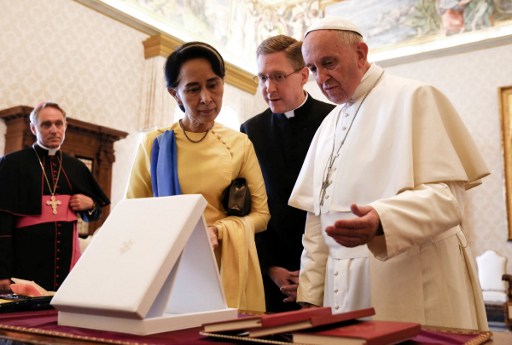Myanmar’s Catholic leaders are apprehensive about Pope Francis’s upcoming visit in late November. The pope is expected to speak in support of the Rohingya, who are largely hated in Myanmar and have been victims of mass displacement and other atrocities at the hands of the Myanmar army. Any rebuke from the pope, local church leaders fear, could have the opposite of its intended effect.
“The pope’s visit is keeping us very anxious, as many things can go wrong. A wrong word from the Holy Father can plunge the country into chaos,” Father Mariano Soe Naing, communications director for Myanmar’s bishops, told Catholic News Service.
“If the Holy Father in his speech evens mentions the Rohingya, the nationalist groups will respond. This is a historic problem, and we need a lot of time to solve this problem. We cannot just say this or that,” he said.
According to the priest, this is the same reason for State Counsellor Aung San Suu Kyi’s refusal to condemn the military’s abuse of the Rohingya.
“Aung San Suu Kyi has no right to comment on anything. The military has the authority to decide everything,” he said. “The whole world wants to criticize her, wants her to fight against the military in favor of full democracy. But that’s a fight she cannot win. She might have the force of the people behind her, but the bloodshed would be terrible. The blood would flow like rivers in this country. The military is not ready to give up easily. She knows that well.”
In June, Myanmar’s Catholic bishops went so far as to advise the Vatican’s diplomatic representative in Myanmar against the pope’s mentioning of the Rohingya by name. The Myanmar government and most local news publications refer to the minority as “Bengalis,” implying that they are illegal immigrants from Bangladesh and undeserving of political rights in Myanmar.
Pope Francis, however, has already mentioned the Rohingya by name and spoken in their defense on numerous occasions, inducing during the Myanmar army’s most recent campaign against them.
On August 27, the pope said: “I would like to express all of my closeness to them,” and he urged pilgrims at the Vatican to pray for “the Lord to save them, to raise up men and women of goodwill to help them, that they may be given full rights.”
Father Soe Naing said the pope’s framing of the issue was widely perceived as problematic in Myanmar.
“When the Holy Father said that we should pray for the Rohingya, people were really angry, because it was Burmese police posts that were attacked, and people died. The pope didn’t mention the terrorist attacks when he asked people to pray for the Rohingya. Why did he leave out the rest of the people who suffered in this country?” he said.
He added: “Our people do not want to hear the word ‘Rohingya.’ We are not allowed to use it in our country. If the Holy Father comes and begins to speak about this conflict, then the nationalists may rise up against him. That is our fear. But we believe that the Holy Father knows what to say and what not to set say. We trust in his wisdom.”
Other Catholic leaders, however, are not so anxious. Win Tun Kyi, director of Karuna Mission Social Solidarity, the aid and development agency of the Myanmar Catholic Church, said the risk of the pope’s commentary on Myanmar’s most controversial issue was not so high.
“When the pope said something about the Rohingya, some of the Buddhist nationalists got very angry. But people tend to forget after two or three weeks. There are new things to get excited about on Facebook and in the media,” he said.




